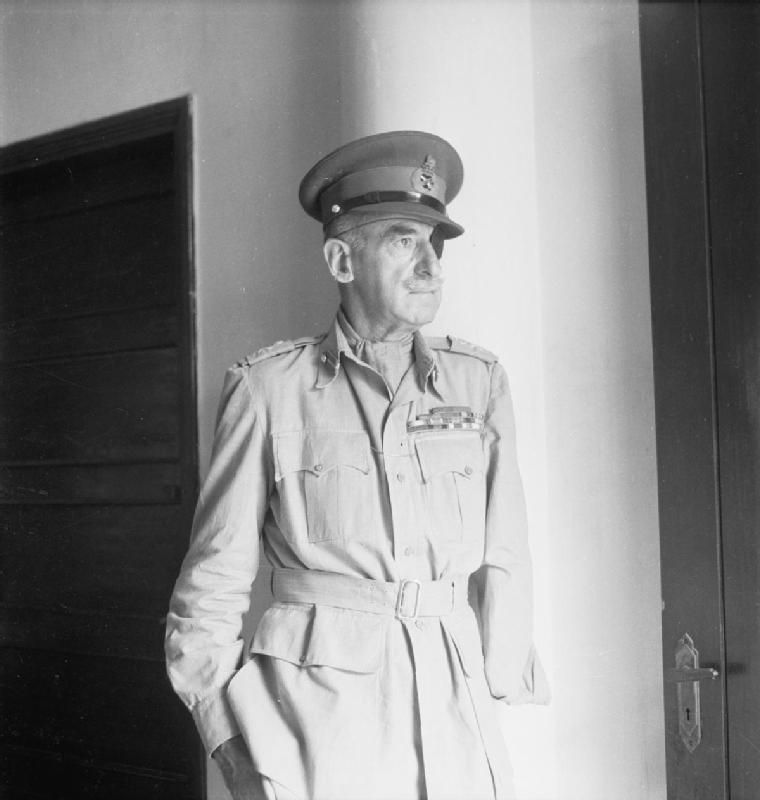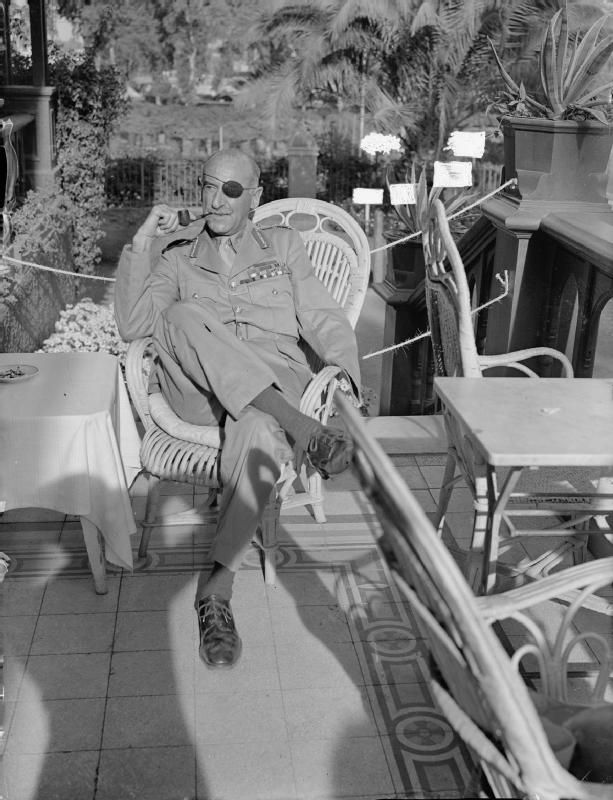No one who has been touched by war has emerged from the experience unchanged. In the case of Adrian Carton de Wiart, who had participated in three major conflicts, war had a profoundly devastating impact. He was shot in the face, head, stomach, ankle, leg, hip, and ear. These injuries left him blind in one eye and he also lost his left hand. Yet, Wiart had a deep affection for war. Despite his disabilities, he repeatedly returned to the front lines and came back with more gashes and broken bones. He was also utterly, stubbornly unkillable. His resilience was nothing short of extraordinary, as he not only survived six decades of warfare but also two plane crashes, a stint in an Italian P.O.W. camp, and a broken back.

Portrait of Carton de Wiart by William Orpen. Photo credit: Wikimedia Commons
Carton de Wiart’s long service career began as a trooper for the British Army in 1899 during the Boer War. Because he was underage, wasn't a British subject (he was born in Brussel) and didn't have his father's consent, he pretended to be 25 and signed up under a pseudonym.
Carton de Wiart had his first brush with death soon after, when he was shot in the stomach and groin, requiring him to be sent back to England. “I returned bereft of glory, my spirits deflating with every mile,” he later wrote in his autobiography, Happy Odyssey, “I do not think it possible for anyone to have had a duller dose of war.”
The serious wound that de Wiart received in the Boer War instilled in him a strong desire for physical fitness and he ran, jogged, walked, and played sports on a regular basis. In male company he was "a delightful character and must hold the world record for bad language."
As the First World War erupted, de Wiart was on his way to British Somaliland, which was embroiled in a low-level conflict against the followers of Dervish leader Mohammed bin Abdullah, referred to as the "Mad Mullah" by the British. Carton de Wiart had been assigned to the Somaliland Camel Corps. During an assault on an enemy fort at Shimber Berris, he sustained two gunshot wounds to his face, resulting in the loss of one eye and a part of his ear. Notwithstanding, Carton de Wiart “enjoyed the war”, as he would later write in his autobiography.

Photo credit: Wikimedia Commons
Lord Ismay, who served alongside Carton de Wiart in Somaliland, later described the incident:
He didn't check his stride but I think the bullet stung him up as his language was awful. The doctor could do nothing for his eye, but we had to keep him with us. He must have been in agony.
[...]
I honestly believe that he regarded the loss of an eye as a blessing as it allowed him to get out of Somaliland to Europe where he thought the real action was.
Carton de Wiart was sent back to England to recover in a nursing home in Park Lane. This nursing home would become his second home over the course of the next few years. Every time he was injured, de Wiart would consistently return to this very facility. It became such a routine that they had a set of his personal pajamas prepared for his upcoming visits.
With his eye patched up, de Wiart returned back to the scene of action—this time in Ypres. During the Second Battle of Ypres, the Germans launched an artillery barrage in which de Wiart's left hand was shattered leaving two of his fingers hanging by some skin. Back at the hospital, when the doctor refused to amputate his two fingers, de Wiart tore them off himself. Later that year, his hand was surgically removed. Carton de Wiart described the entire experience as an “entertainment” which was “no worse than having a tooth out.”

Photo credit: Wikimedia Commons
After a period of recovery, de Wiart once more managed to convince a medical board he was fit for battle. In 1916, he took command of the 8th Battalion, Gloucestershire Regiment. During the Battle of the Somme, he was shot through the skull and got sent back to Park Lane. The doctors there told him that the bullet had gone straight through the back of his head without touching a vital part. “The only after-effect of this wound was that whenever I had a haircut the back of my head tickled,” he wrote.
As soon as he had recovered, de Wiart returned back to war only to be shot at the ankle, and shortly afterwards, through the leg and through the ear.
Carton de Wiart received the Victoria Cross, the highest award for gallantry in combat that can be awarded to British Empire forces, in 1916. His citation reads:
He displayed conspicuous bravery, coolness and determination in forcing home the attack, thereby averting a serious reverse. After the other Battalion Commanders had become casualties, he controlled their commands as well, frequently exposing himself to the intense barrage of enemy fire. His energy and courage was an inspiration to us all.
In 1941, during the British military mission in Yugoslavia, Carton de Wiart’s airplane got shot over the Mediterranean and the plane crash-landed in the sea about a mile from land. Carton de Wiart was knocked unconscious, but the cold water made him regain consciousness. In spite of the freezing waters and the lack of an arm, de Wiart helped many comrades swim to the shore only to be captured by Italian troops on arrival. While a prisoner-of-war at the Vincigliata Castle, de Wiart orchestrated a daring escape attempt that involved seven months of tunnel digging. Carton de Wiart evaded capture for eight days disguised as an Italian peasant. At that time, he was 62 years old, cold barely speak Italian, and had an eye patch, one empty sleeve and multiple injuries and scars.

Photo credit: Wikimedia Commons
Carton de Wiart retired in 1947, with the honorary rank of lieutenant-general. Despite staying away from action, misfortune had an uncanny knack for making its presence felt in his life. While staying as a guest of the army commander in Rangoon, de Wiart slipped on coconut matting, while coming down the stairs, and broke several vertebrae and was knocked unconscious.
Carton de Wiart has been called the most battle-scarred soldiers in the history of the British Army. More recently, Swedish heavy metal band Sabaton released a song on de Wiart titled “The Unkillable Soldier”.
References:
# Lure Of Duty: The Extraordinary Life Of An Immortal Soldier, The Rake
# Adrian Carton de Wiart: The unkillable soldier, BBC












Comments
Post a Comment